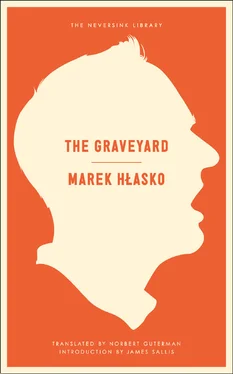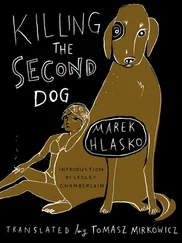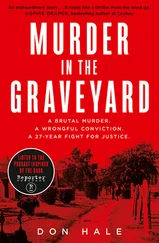Franciszek automatically patted his pockets. “No,” he said; “they were taken from me.”
The other man moved closer. “What for?” he asked hoarsely.
“What do you mean, what for?”
“Why did they arrest you?”
“Oh,” said Franciszek, smiling. “I was a little tight, that’s all. I just sang in the street.”
After a moment of silence, Franciszek’s neighbor said in a worried voice: “That’s bad. Very bad.”
“Bad?” Franciszek asked. “Why?”
“You can get a long term for singing,” the other said. “You think it’s only a song, nothing at all; you think you’re innocent, still … Did you resist?”
“No, not at all; I only flew off the handle a bit.”
The stranger yawned. “Knock on the door,” he said. “If someone comes, ask him; maybe they’ll let you go. What time do you think it is?”
“I don’t know. Three, maybe later …”
The stranger pondered awhile. “By now Lieutenant Malinowski should be on duty,” he said. “He’s a good egg. If he comes here, ask him politely, and he’ll let you go — if it’s true you didn’t do anything.”
“But of course I didn’t do anything,” Franciszek said with a shrug. “I’m telling you, I was a little drunk, and I sang.”
“What did you sing?”
“Does it matter?”
“Of course it does. There’s a world of difference between one song and another. What did you sing about?”
“I don’t remember, and then, it’s really beside the point … An old army song.”
The stranger whistled. “Couldn’t be worse,” he said. “You’re in for it, sure as the Our Father ends with Amen.” He bent over someone, and shook him by the arm. “Mr. Sikorski, Mr. Sikorski! Would you sing the song they locked you up for?”
A man invisible in the darkness sang:
“Once I walked home late at night
And suddenly it’s the end of my freedom.
Plain-clothes men, tommy guns,
Identification, secret po-o-o-lice …”
The singer finished, and swore lustily. Franciszek’s neighbor said: “Now, you see. There’s a difference between one song and another. If you were singing that when they hooked you, it would be bad.”
“I’ve never heard it before,” Franciszek said. “And I’d never sing anything so stupid. I’m telling you, I sang an old army song.”
“You must remember what it was,” the other said resolutely. “It’s vital. You have to know why they locked you up. When you’re questioned you have to know what it’s all about, and how to behave. What song could it be? ‘The Legions’? Probably not, or you’d remember. Anyway, ‘The Legions’ doesn’t amount to a hill of beans; at the most you’d get eighteen months for it. What damn’ thing can it be? Aha,” he drawled, “could it be this? Just a moment.” He shook someone violently. The shaken man sat up and began to rub his eyes. Franciszek’s neighbor asked: “Mr. Nowak, what were you singing when they picked you up?”
The man addressed as Mr. Nowak sobbed a moment, and then sang in a gentle, soft tenor:
“Great Marshal Stalin, long live he!
His lips are sweet as raspberry!
He is my dream, for him I long,
He is my life’s enchanting song.”
No sooner had he finished than he lay down to sleep again. Franciszek’s neighbor asked: “Was that it?”
“No.”
“Please, try to remember. Sometimes you get more for a joke than for a song.” He suddenly turned around and called out into the darkness, “Hey, Mr. Aleksandrowicz!”
“Yes,” someone said at the other corner of the cell.
“What did that fellow get, the one that was here last month — you know, the one that told the joke about Little Boy Joe?”
“His case hasn’t come up yet,” came the reply from the other corner, “but I don’t think he’ll get off with less than five years. The other fellow who was with him and told the grain-hoarding joke got three years, so how much would you think the other one’s good for?”
Franciszek’s neighbor sighed. “You see,” he said, “there are words and words. Well, brace yourself … Happen to have a cigarette?”
“I told you I didn’t,” Franciszek said. The conversation was getting on his nerves.
The stranger yawned. “Too bad,” he said. “You won’t mind, then, will you, if I take a litle nap to get my strength back. Every time I spend the night here I dream of grapevines in the southern sunlight. I love Greece. I have visions of noble-faced sages in long tunics, of virgins in transparent robes gliding about among cypresses in full bloom. Even in this cell I can hear their songs throbbing with the joy of life …” Leaving the sentence unfinished, he dropped like a log, and began to snore with such force that Franciszek shuddered.
Once again Franciszek had a fit of rage. “Damn it,” he thought, “is it really fair that just because a man sings out loud in the street he should be locked up for the night with hooligans and drunks? Just because a man takes a glass of vodka, must he be treated like the lowest kind of tramp?”
He stood up abruptly, and, heedless of the groans and growls of those he was trampling on, walked to the door and pounded it until his fists hurt. No one came; he could hear only screams and curses, coming probably from another cell at the end of the corridor. Franciszek kicked the door, once, twice; only then did he hear the clicking of a lock somewhere far away, followed by the sound of footsteps. “At last,” he thought, relieved, and wiped his forehead. The lock creaked, the door opened slowly, and before him stood a small man with a jolly round face, wearing the uniform of a lieutenant. “This must be the one,” Franciszek thought with satisfaction; “this must be the lieutenant that fellow talked about.”
“What do you want?” the lieutenant asked. His voice was calm and soft, with none of that irritating coldness that characterizes bureaucrats the world over, and Franciszek felt at once that he could trust him.
“I’d like to talk with you,” he said, trying to speak politely and distinctly.
“What do you want?” the lieutenant repeated.
“I have the impression that I was arrested by mistake. I was only walking in the street; I might have been a little tight, and I don’t know why I felt like singing; after all, I’m no kid, and I was once shot in the lungs, and I’d like to avoid catching cold. Could you release me?”
The lieutenant scrutinized him awhile. “Hold out your arms and close your eyes,” he said. He said it very courteously, and Franciszek complied at once. “And now,” said the lieutenant, “tell me quickly your name, address, and occupation.”
“My name is Kowalski; I live in the Muranów housing project; I work in an automobile repair factory as assistant technical director.”
“Fine,” said the lieutenant. “Drop your arms. I’ll see what I can do.”
Opening his eyes, Franciszek saw that the lieutenant was smiling. “Come with me,” he said. He closed the door; once again they walked along the stinking dimly lit corridor. The whole police station reeked of stale alcohol; the stench was so strong that Franciszek was disgusted with himself.
“How did you get shot in your lungs?” the lieutenant asked.
“In the underground,” Franciszek said. “In 1943.”
“You were a partisan fighter?”
“Yes.”
“The National underground or the Communist underground?”
“The Communist. The People’s Army.”
The lieutenant smiled again. “And now you’ve gone and got yourself arrested,” he said.
Franciszek perceived a note of friendly chiding in his voice. “Those boys of yours are so serious,” he said, “I couldn’t talk them out of it.”
Читать дальше






![Ричард Деминг - Whistle Past the Graveyard [= Give the Girl a Gun]](/books/412176/richard-deming-whistle-past-the-graveyard-give-t-thumb.webp)


